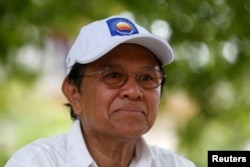Cambodian political observers say intimidation has been a widely used tool in the government for decades but that recently, there has been a shift in the practice to ensure the ruling party wins the next national election.
Scores of former opposition members and activists were summoned to court, self-exiled opposition leader Sam Rainsy was sentenced to prison, and a group that included opposition supporters was interrupted while eating traditional Cambodian noodles.
Authorities say the summoning of opposition members was needed to investigate alleged illegal activities and the disregarding of court orders.
But Mu Sochua, vice president of the now-dissolved opposition Cambodia National Rescue Party, thinks the developments are part of a long-term strategy by Cambodian Prime Minister Hun Sen’s party to secure a victory in the elections scheduled for 2023.
She said local authorities wouldn’t dare act without direction from their superiors and were implementing orders from the prime minister. “He [Hun Sen] is very certain that he cannot compete with us. And he is now even more threatened,” she said. “He knows that the grassroots of the CNRP are very, very deep, deep in every single village. He knows it because after 2017, when the party was dissolved, the grassroots did not defect as he expected...”
Phil Robertson, deputy Asia director of Human Rights Watch, agreed, and said in an email to VOA that the court summonses serve to "harass and intimidate local CNRP councilors."
“Clearly, the government aims to compel silence at the grassroots in the provinces and further pressure exiled CNRP leaders to dedicate precious time and efforts to defend their members. So far, the Cambodian government has been effective in stampeding many activists out of the country and it looks like they are now taking aim at the thousands of local CNRP councilors, who were stripped of their seats when the government-controlled court banned the party,” he said.
Last week, human rights group Civicus Monitor observed “ongoing judicial harassment and attacks on opposition leaders and activists."
Cambodia government spokesman Phay Siphan denied that authorities were attempting to harass local opposition activists. Instead, he said they were investigating whether national security was under threat, with local activists potentially meeting to plot against the government. They were also collecting evidence, he said, as to whether a Supreme Court ruling that banned 118 opposition members from politics for five years had been disregarded.
“It doesn’t mean ex-opposition party members have the right to do everything they like, no! They have to respect national security,” he said.
Old strategy in a new framework
Robertson and Sochua said they believed that intimidation of the opposition had long belonged to the ruling Cambodian People's Party’s playbook on how to govern; however, they both argued that a perceived shift had taken place in recent months.
“What's new in the government's strategy is the focus on targeting local CNRP councilors who have previously been largely ignored while the authorities went after party leader Kem Sokha, national [members of parliament], and CNRP leaders in exile,” Robertson said.
The apparent targets are the provinces Battambang, Banteay Meanchey and Kampong Thom, regions that traditionally have supported opposition parties.
While agreeing that a shift had taken place since the dissolution of the CNRP, political analyst Meas Nee views the recent action in a larger context. He argues that the Cambodian People's Party, or CPP, had lost its grip over local communes and was now trying to re-establish control of villages and communes that it had held in the 1980s, but had gradually lost since.
“I think the structure of the ruling party to control the people has been weakened,” he said, explaining that human rights abuses, such as land grabbing, had pushed people to increasingly support opposition movements.
But while in the 1990s many people were too afraid to openly align with opposition parties because some supporters were killed, he said people were now less afraid to support the CNRP. The CPP, he argues, was therefore attempting to regain control by monitoring people on the local level. “Now I think [authorities] have their own system back in place,” he said.
The ruling party ran a two-coin strategy, Nee said, of strengthening its own local structure, while at the same time attempting to destroy the opposition.
For opposition figure Sochua, the government pretexts to intimidate the opposition were unlikely to stop soon, and would often take place under the justification of an alleged “color revolution,” or resistance effort, being planned by the opposition.
“Whether we eat noodles, whether we drink coffee, whether we dig a hole together, whether we stand on a street together, there will always be an excuse used to label it as color revolution. Whether we walk around naked, it will still be a color revolution,” she said.








